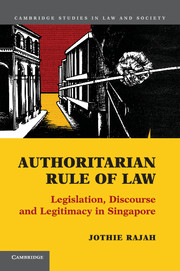Book contents
- Frontmatter
- Contents
- An Insider’s Preface on ‘Rule of Law’ Confusions
- Acknowledgements
- 1 Law, Illiberalism and the Singapore Case
- 2 Law as Discourse
- 3 Punishing Bodies, Securing the Nation
- 4 Policing the Press
- 5 Policing Lawyers, Constraining Citizenship
- 6 Policing Religion
- 7 Entrenching Illiberalism
- 8 Legislation, Illiberalism and Legitimacy
- Bibliography
- Index
- References
4 - Policing the Press
Newspaper and Printing Presses Act
Published online by Cambridge University Press: 05 June 2012
- Frontmatter
- Contents
- An Insider’s Preface on ‘Rule of Law’ Confusions
- Acknowledgements
- 1 Law, Illiberalism and the Singapore Case
- 2 Law as Discourse
- 3 Punishing Bodies, Securing the Nation
- 4 Policing the Press
- 5 Policing Lawyers, Constraining Citizenship
- 6 Policing Religion
- 7 Entrenching Illiberalism
- 8 Legislation, Illiberalism and Legitimacy
- Bibliography
- Index
- References
Summary
This chapter presents a second case study: the 1974 Newspaper and Printing Presses Act (or Press Act). This case study demonstrates the manner in which the enactment of legislation has undermined and reconfigured a freedom closely connected to the freedom of expression and the pluralism of political liberalism: the freedom of the press. If the Vandalism Act has been a ‘law’ through which the visible, public space of ‘nation’ has been rendered ideologically homogenous, then the Press Act is the tool through which the discursive space of ‘nation’ has been homogenised. The technologies of press management entrenched by the Press Act have resulted in a highly policed discursive space in the ‘nation’, leading to an ever greater legal and discursive conflation between ‘nation’ and the PAP-state.
The 1974 enactment of the Press Act is inextricably linked to events in 1971, when three Singapore newspapers were subject to a series of repressive government measures that resulted in the closing down of two newspapers and a change of ownership and control of a third. The state accused all three papers of undermining national security. According to the state, the papers had advocated divisive Communalist agendas, overtly or covertly furthered the cause of Communism or had undermined the ‘nation’ by being proxies for foreign interests. Three years after these events, the 1974 Press Act was brought into being. Before proceeding to an analysis of the Press Act, this chapter traces texts and events that operated as a proto-enactment of sorts: Lee Kuan Yew’s 1971 address to the International Press Institute (IPI) justifying the detention without trial of the four newspaper executives. These detentions and the state’s discourse at the time demonstrate how, in 1971, the state strategically used the public domain as a performative space, presenting its discursive legitimisations for ‘rule by law’ in a manner that lent dramatic urgency to its narratives of national vulnerability.
- Type
- Chapter
- Information
- Authoritarian Rule of LawLegislation, Discourse and Legitimacy in Singapore, pp. 117 - 160Publisher: Cambridge University PressPrint publication year: 2012
References
- 1
- Cited by



